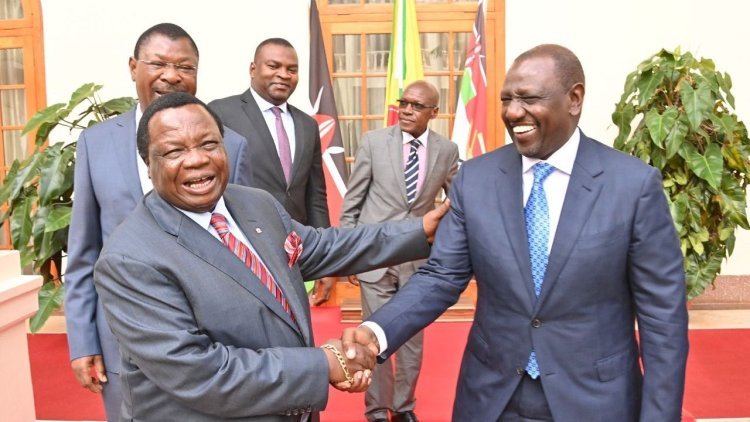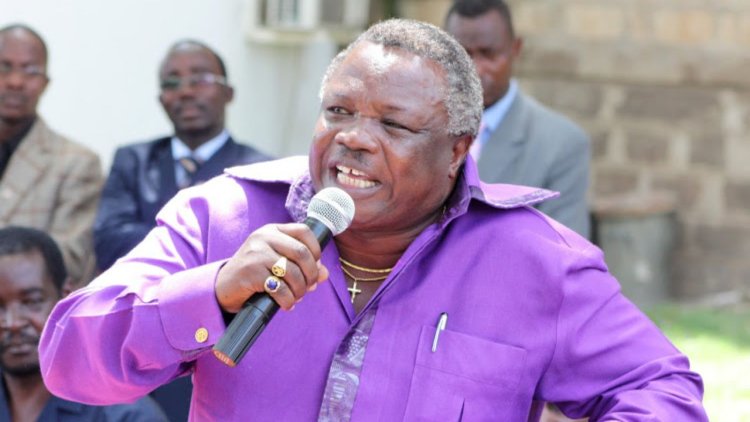Atwoli: How Ruto's Plan Will Prevent Kenyans From Using Mobile Money
He reminded the Head of State that the downtrodden are the ones who voted him into power in August 2022

Central Organization of Trade Unions (COTU) Secretary General, Francis Atwoli has cast doubts on the move by President William Ruto's administration to gain access to mobile money transactions.
While terming the move as ill-advised and counterproductive, Atwoli in a statement on Friday, January 20 advised the government to ensure that outsourcing companies regularize the employment terms and conditions and that they pay all the statutory deductions including Pay As You Earn (PAYE) and National Social Security Fund (NSSF).
He reminded the Head of State that the downtrodden are the ones who voted him into power in August 2022, many of them use mobile banking means and such a move to snoop on their mobile money transactions could deter them from transacting using that means.
"First, a majority of users of mobile banking are hustlers and the poor who overwhelmingly voted for this government. Second, this move will ultimately make Kenyans avoid using mobile money platforms and as a result, destroy a great innovation that has since helped ease the movement of money, especially from the urban to rural areas.

"The resolve by the government to snoop on mobile money transactions will have a similar effect to the move by the US government, in the 1920s, through the 1920 Volstead Act, to prohibit the manufacture and sale of alcohol in an attempt to make America more peaceful. This Bill was counterproductive considering it gave rise to bootlegging: an illicit supply of alcohol," he stated.
Atwoli added that such a resolution could force Kenyans to turn to other means of transaction such as courier and parcel services to send, receive, withdraw and deposit money.
Instead, COTU (K) invited the government to crack down on outsourcing companies whilst formalizing many jobs in the informal sector.
"Rather than monitoring and investigating mobile money transactions, the government should ensure that the more than the 5,000 outsourcing companies regularize the employment terms and conditions of work for their employees by ensuring that they pay all the statutory deductions including PAYE, NSSF, and NHIF among others," he went on.
He further exposed how most private security firms and many outsourcing companies in the agricultural, service, manufacturing, hospitality, education, transport, construction, financial, and other key sectors of the economy, don't pay any taxes to the government despite employing millions of Kenyans.
A recent study, which was corroborated by COTU (K) Economic and Research Department, found that private security firms employ more than 1.2 million Kenyans with a majority of these security officers underpaid in cash and, way below the minimum wage. Generally, more than three million Kenyans employed by outsourcing companies are paid in cash and below the minimum wage.
"If only the government can clamp down on these companies that outsource labour, they will collect the much-needed taxes to operationalize some of the promises in the Kenya Kwanza manifesto.
"Further, the government should work with other partners in the labour sector and ensure the formalization of many jobs in the informal sector to ensure the government gets its fair share of the revenue. It is possible to collect taxes even from mama mboga if the government becomes innovative and uses incentives," Atwoli added.
The COTU boss further called upon the National Treasury, and by extension, the Kenya Revenue Authority (KRA), to think innovatively and creatively as the world of work is changing, which is leaving no room for the continuous adoption of simplistic measures such as snooping on mobile money transactions to raise taxes for the government.
The National Treasury on Wednesday, January 18 released a draft 2023 Budget Policy Statement in efforts to expand tax collection bases in Kenya through government agencies following a directive by President William Ruto.
The government is targeting to collect up to Ksh4 trillion by 2024 and Ksh3 trillion by the financial year 2023/24. In order to attain this target, the government agencies responsible for the collection and enforcement of tax policies are seeking to tap additional revenue from the multi-billion telecommunications industry.
Telcos in Kenya make billions of shillings by providing various services to customers such as voice calls, text messaging, internet access as well as mobile money services to Kenyans on a daily basis.

A person using a smartphone. /FILE
President Ruto in October 2022 expressed concern about how there are only seven million people bearing KRA PINs while at the same time, over 30 million Kenyans transact billions of shillings.
“The fact that this opportunity remains unclear to KRA demonstrates why radicle changes are necessary,” President Ruto said at the time.

 admin
admin 




